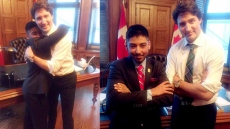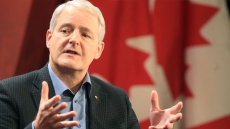OTTAWA — Canadians enduring intolerable suffering from grievous and irremediable medical conditions should be able to seek medical help to die with few obstacles, a special parliamentary committee has recommended.
The relatively permissive approach, urged by the majority of MPs and senators in an all-party joint committee report tabled Thursday, was immediately lauded by advocates of doctor-assisted death.
But it was denounced by Conservative MPs on the committee for failing to protect vulnerable persons. They filed a dissenting report, although Conservative senators backed the majority position.
The committee's recommendations are intended to guide the federal government as it crafts new legislation in the wake of a Supreme Court of Canada ruling last year that struck down the ban on assisted suicide.
The top court has given the government until June 6 to come up with a new law that recognizes the right of clearly consenting adults who are enduring intolerable physical or mental suffering to seek medical help in ending their lives.
Justice Minister Jody Wilson-Raybould said she'll thoroughly review the committee's recommendations and hopes to have draft legislation ready to take to cabinet within a couple of weeks. She promised to "engage" further with Canadians on "this very sensitive and important issue."
"We're looking to ensure that we continue to take an empathetic approach, that we look to create balance in our approach that recognizes the autonomy of individuals, that recognizes the need to protect the vulnerable, that respects the conscience rights of medical practitioners," Wilson-Raybould said.
Consistent with the Supreme Court ruling, the committee recommended that the right to seek medical assistance in dying should include people suffering from both terminal and non-terminal physical and psychological medical conditions. It should not exclude people with mental health problems.
Moreover, the committee said individuals diagnosed with incurable conditions that are likely to cause loss of competence, such as dementia, should be able to make advance requests for medical assistance in dying.
That recommendation won particular praise from Dying With Dignity Canada's Shanaaz Gokool.
"Without the option to consent in advance to assisted dying, Canadians with dementia who want to die in peace with the help of a physician face a dire choice: access assisted-dying prematurely, while they are still competent, or risk losing competence before their wishes can be carried out, only to be condemned to the exact fate they sought to avoid," Gokool said in a statement.
The committee also recommended that physician-assisted dying be immediately available to competent adults 18 years or older and — after further consultations — expanded to include "mature minors" within three years.
Furthermore, it said the federal government should work with the provinces to ensure medical assistance in dying is available in all publicly funded health-care facilities and that any required period of reflection be flexible, taking into account how rapidly a patient's condition is progressing.
Health-care practitioners should be able to refuse to provide assistance but the committee said, at a minimum, conscientious objectors must provide an "effective referral" for a patient who asks for aid in dying.
The committee said the federal government should also work with the provinces to ensure, where possible, that requests for medical assistance in dying are made in writing, witnessed by two people who have no conflict of interest and that it be carried out only if two physicians, independent of one another, determine that the eligibility criteria have been met.
Conservative MPs on the committee said the majority report "falls far short" of what is necessary to safeguard vulnerable people from being pressured or coerced into seeking medical help to die or to protect mentally ill people who might not be competent to make such a decision.
In particular, they objected to extending the right to die with a doctor's assistance to anyone under the age of 18. Alberta MP Michael Cooper said the Supreme Court was clear that the right to medical aid in dying applied only to competent adults.
"We find it very troubling that the committee would disregard the clear pronouncement of the Supreme Court by opening the door to minors," he told a news conference shortly after the committee report was tabled in both the House of Commons and Senate.
Wilson-Raybould declined to offer her personal opinion on that issue.
The Conservative MPs also objected to the notion of advance directives and expressed shock that the majority report does not recommend requiring a psychiatric assessment for anyone seeking medical help to die.
"There is no group that is more vulnerable than people with underlying mental health challenges, on the question of capacity and on the question of consent," Cooper said, accusing the committee of disregarding the top court's directions that there should be "stringent safeguards" for such people.
As well, the Conservative MPs said the majority report fails to adequately safeguard the rights of health-care practitioners who conscientiously object to helping patients die.
The New Democrats supported the majority report but wrote a supplementary report, urging the federal government to demonstrate leadership by providing improved palliative care for people under federal jurisdiction, such as indigenous people, veterans and members of the armed forces.
They also urged the government to extend compassionate care benefits for family members who take time off work to care for a loved one.





